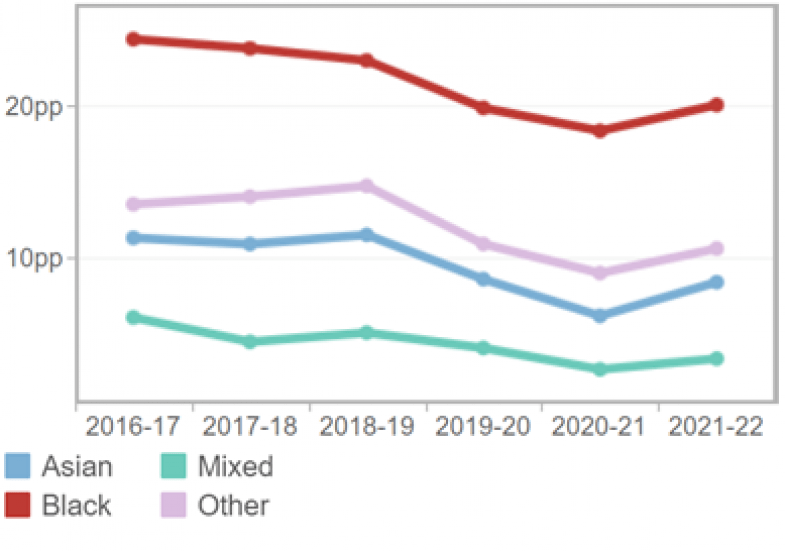For over two decades, many studies have highlighted that students from ethnic minority backgrounds in the UK are less likely than their white peers to achieve first- or upper second-class honours degrees. The Office for Students’ dashboard is just one example, indicating that black graduates were approximately 20 percentage points less likely to obtain such a classification at English universities between 2016/17 and 2021/22.
In 2019, the OfS introduced an intersectional measure of disadvantage, combining ethnicity with the Index of Multiple Deprivation (IMD) to better identify barriers to equality of opportunity. The regulator encourages higher education providers to use this data to inform action plans and educate staff and students on addressing these disparities.
Intersectionality has wide and intuitive appeal as an explanation of the awarding gap. It posits that gender, ethnicity and class, when combined, have an effect on educational outcomes that is over and above that of the single factors in isolation. And it makes sense that a black undergraduate from a deprived background, for example, would face obstacles that a black higher-status or white working-class peer would not.
However, intuition isn’t always right, and there has actually been very little empirical work done, using nationally representative data, to substantiate the intersectionality theory in UK higher education. To address this, I conducted a study using data from the Higher Education Statistics Agency’s 2018/19 graduate outcomes survey, the results of which were recently published in Studies in Higher Education.
Percentage point gap between white and other ethics groups achieving first- or upper second-class degrees

I found that, in fact, the interaction of ethnicity, sex, and socio-economic status does not significantly contribute to our understanding of the ethnic awards gap. The study confirmed that being from an ethnic minority background, being male, and coming from a lower socio-economic status each had significant individual penalties. But after controlling for a rich set of personal characteristics, the probability of obtaining a good degree was not sensitive to the addition of interaction terms for ethnicity, sex, and three measures of socio-economic status (IMD, occupational background and parental educational attainment).
In other words, while there was an ethnic penalty, a separate class penalty and a separate male penalty, there wasn’t really a penalty for coming from a poorer ethnic minority background – at least, not in 2018/19.
But if intersectionality is not the primary driver of the ethnic awards gap, what is? One factor could be the over-representation of ethnic minorities in UK higher education since the 1990s. According to the Office for National Statistics, white students were the least likely to progress to higher education by age 19 in 2021/22: only 41.8 per cent did so, compared with 51.5 per cent for mixed, 63.5 per cent for Black, and 67.8 per cent for Asian and 83.8 per cent or Chinese school leavers.
This means that ethnic minority groups are likely to include a broader range of abilities compared with white groups. If lower ability levels significantly impact performance in higher education – and there is consensus in the literature that they do – then this implies it will be challenging to close the awards gap.
There are suggestions that fewer job and apprenticeship opportunities for ethnic minority school leavers might drive their over-representation in higher education. Hard evidence on this is scarce, but if it is true, the degree awards gap could be symptomatic of broader socio-economic issues beyond the reach of higher education interventions alone.
Of course, the awarding gap regarding Chinese students is smaller even though a large proportion of them go to university. There are longstanding suggestions that British Chinese students may excel academically because of family norms stressing academic excellence, including for relatively lower ability students, but research on this phenomenon is limited.
Either way, it is curious that the OfS has not investigated the possible link between ethnic minority over-representation and the awards gap before setting targets for the sector. It has been 17 years since the government last commissioned a robust analysis of the ethnic awards gap. Therefore, it is imperative that data linking prior school attainment and performance in higher education be analysed to determine if ability compositional effects are driving the ethnic awards gap.
Until we can be confident about those drivers, we should prioritise evidence-based practices. These could include teaching effective learning and study skills early in school and fostering psychosocial integration for ethnic minority students upon entering higher education. Examples of the latter could include academic mentoring schemes for those most at risk of underperformance, pastoral support that addresses the unique needs of students with lower academic preparedness, and institution-led and funded peer support networks.
Such schemes may face headwinds given the current funding pressures in the sector. But of regulators really want to close the ethnic awarding gap, as they should, they need to follow the evidence and properly fund the solutions that that evidence points towards.
Sean Brophy is senior lecturer in the Business School at Manchester Metropolitan University. His paper, “Ethnic minority underachievement in UK higher education: an analysis of nationally representative data provides little support for the intersectionality thesis”, is published in Studies in Higher Education.
Register to continue
Why register?
- Registration is free and only takes a moment
- Once registered, you can read 3 articles a month
- Sign up for our newsletter
Subscribe
Or subscribe for unlimited access to:
- Unlimited access to news, views, insights & reviews
- Digital editions
- Digital access to THE’s university and college rankings analysis
Already registered or a current subscriber?








